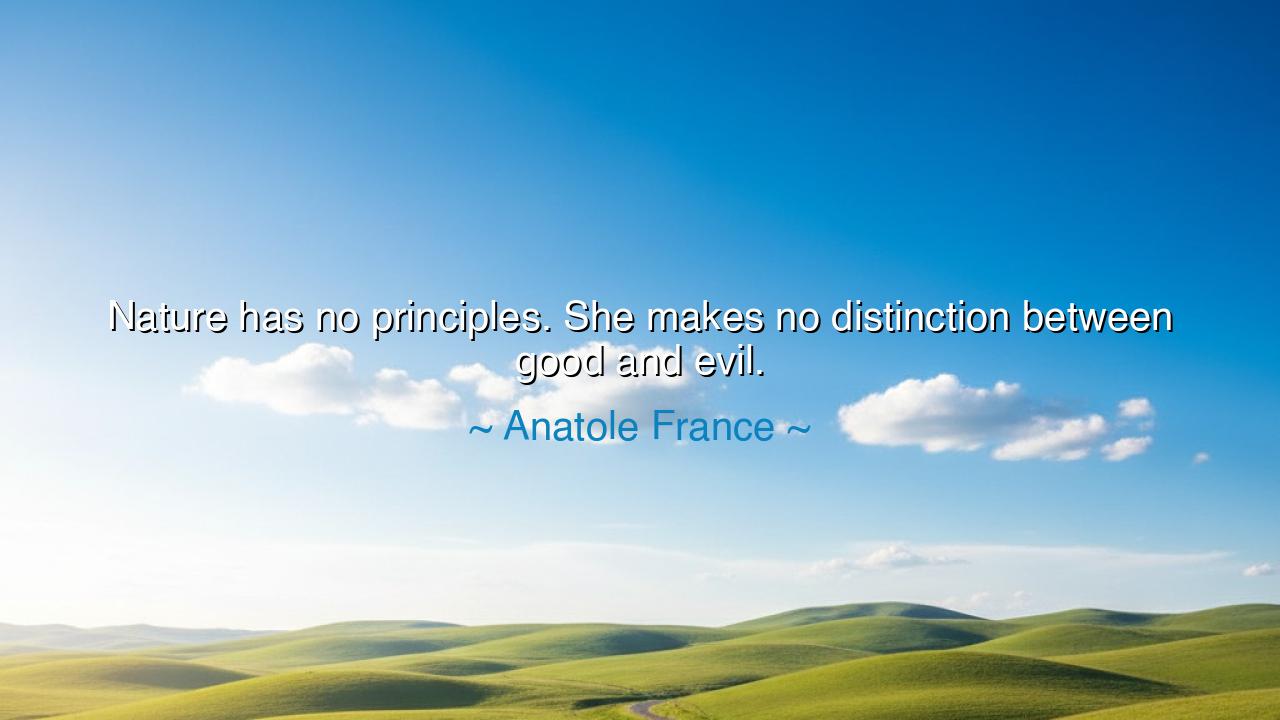
Nature has no principles. She makes no distinction between good






Hear the sobering words of Anatole France, who declared: “Nature has no principles. She makes no distinction between good and evil.” These words cut like a blade into the illusions of humankind, for they remind us that the laws by which we measure morality are not written into the stones, the seas, or the stars. The storm does not withhold its fury because the victim is innocent; the lion does not spare the lamb because the lamb is pure. Nature follows her course without judgment, without mercy, without the scales of justice that humanity so desperately clings to.
This is not to say that Nature is cruel—only that she is indifferent. The rising of the sun, the falling of the rain, the trembling of the earth, the blooming of flowers—these are not acts of goodness or evil, but of necessity, of balance, of eternal unfolding. It is we, with our hearts and our consciences, who draw the lines between good and evil. But the mountains are unmoved by our categories, and the ocean does not pause to consider whether its waves destroy a fleet of warships or wash upon the feet of children at play.
Consider the tale of Pompeii, the city buried beneath the wrath of Vesuvius. In that eruption, the wealthy and the poor, the virtuous and the corrupt, the young and the old—all were swallowed alike by fire and ash. To the volcano, there was no difference between them. To Nature, they were not judged; they were simply present in her path. Thus Anatole France speaks truth: Nature makes no distinction between good and evil.
And yet, within this harsh reality, there lies a deeper wisdom. If Nature is beyond morality, then it is humanity’s sacred task to create it. It is within us, not in the earth or sky, that compassion is born, that justice is written, that kindness takes root. The very indifference of Nature compels us to fashion our own principles, to care for one another, because the winds and waters will not. What Nature withholds, the human heart must supply.
History gives us shining examples of this. When plague swept through Europe, the pestilence made no moral judgments; it consumed the righteous and the wicked alike. But in the midst of it, there were those who stayed behind to care for the sick, risking their lives to bring comfort. Their heroism was not dictated by Nature, but by choice. In their courage, one sees the spark of human morality shining all the brighter against the backdrop of a world indifferent.
The meaning of the quote, then, is twofold: it warns us against expecting fairness from the universe, and it calls us to greater responsibility. If we wait for Nature to reward the just and punish the wicked, we shall wait in vain. But if we take upon ourselves the duty to distinguish good from evil, and to live by those distinctions, then we become the torchbearers of justice in a world where storms, beasts, and disasters know no such light.
The lesson for us is this: do not despair at the indifference of Nature, but let it steel you. Accept that suffering may come without reason, that blessings may fall upon the undeserving, and that fortune is no measure of virtue. Instead, cultivate within yourself the principles that Nature does not provide: kindness, justice, courage, love. In this way, though the earth may remain neutral, your life becomes a source of meaning and light.
So let the words of Anatole France endure: “Nature has no principles. She makes no distinction between good and evil.” Do not curse her for this truth, but let it awaken you. For it is not Nature’s task to be moral—it is ours. And if we live rightly, we shall stand as beacons of goodness in a universe vast, powerful, and silent.






AAdministratorAdministrator
Welcome, honored guests. Please leave a comment, we will respond soon